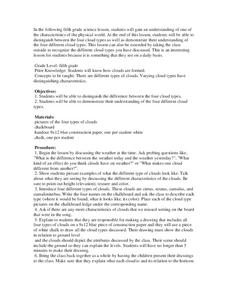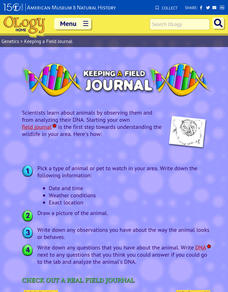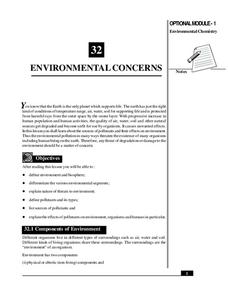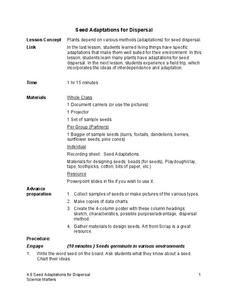Curated OER
Types of Clouds
In this science activity, students read about four different types of clouds. Students also read a table that illustrates the heights each type of cloud can reach in the atmosphere.
Class Antics
Leap Year: Write a Newspaper Article
Extra! Extra! Read all about leap year! Here, scholars write a newspaper article all about leap year/leap day from given facts including who, what, where, when, and why.
Curated OER
Write On! Step by Step Paragraph and Report Writing
Students plan and write paragraphs while integrating other core subject areas. In this paragraph writing lesson, students complete 5 lessons to practice writing paragraphs. Students incorporate various core subjects into their paragraph...
Curated OER
Clouds
Learners explore various cloud types. In this earth science activity, students use pictures of the four types of clouds and identify them by name. Learners construct pictures of clouds using chalk and blue paper.
Curated OER
Valentine Science Blood Types
Students explore blood types. In this science investigation instructional activity, students participate in a classroom simulation that replicates a blood transfusion so that students may note how the 4 blood types interact.
International Technology Education Association
Pixel This!
Did the image I drew match the image you saw? By simulating a satellite and a ground station, teams of two transmit data in the form of pixels in order to recreate an image. They use four different levels of brightness, creating slightly...
Curated OER
Whose Home Is This?
After reading a short and informative paragraph on animals and their environments, learners look at pictures of four animals, and write a short description of how each one has adapted to its environment. A suggested activity is that each...
Virginia Department of Education
Weather Patterns and Seasonal Changes
Get your class outside to observe their surroundings with a lesson highlighting weather patterns and seasonal changes. First, learners take a weather walk to survey how the weather affects animals, people, plants, and trees during...
Curated OER
Introduce a Weather Unit
Engage your learners by playing Water Music Suite by Handel. Different types of weather sounds play on the recording, and it's an easy lead into talking about the weather! What is weather? What kinds of weather exist? What is it called...
Curated OER
An Animal Report
Third graders create reports in the fashion of small books. They write brief descriptions for a variety of topics and answering a variety of questions. They create a picture book for their individual animals. They utilize basic computer...
Curated OER
Grossmont College - Chem 115 Practice Exam 2
Here is a straightforward practice test for first year chemistry learners. Responders balance equations, identify types of reactions, represent electron configurations, and solve stoichiometry problems. Keep this handy to use as...
Curated OER
What is it...A Frog or a Toad?
Young scholars write a story. In this frogs and toads comparison instructional activity, students read facts comparing frogs and toads, use a t-chart to record factual information and complete a Venn Diagram. Young scholars complete a...
American Museum of Natural History
Keeping a Field Journal
Young scientists begin a field journal by following four steps. A real-world example of an entry showcases the different parts, including location, date, drawings, and more.
Virginia Department of Education
Chemical Bonds
How are chemical bonds similar and how are they different? Provide your young chemists with the resources to more thoroughly understand the concepts of ionic and covalent bonds. Pupils research these topics, diagram examples of each...
British Council
Weather 1
Match weather words with pictures in a weather vocabulary learning exercise. Beginning readers look at pictures of various weather patterns and choose/write the word that describes the weather. They create a map and write about the...
Scholastic
Spring Is Sprung: Water Movement in Plants
Young scientists use food coloring and celery stalks to determine how water travels through plants.
Curated OER
"Four" Goodness Sake
Fourth graders recognize that ethnicity, religion and geography are reflected in the food choices we make. In this food choices lesson, 4th graders discuss different types of food from different places. Students compare a menu to the...
University of Georgia
Energy Content of Foods
Why do athletes load up on carbohydrates the evening before a competition? The lesson helps answer this question as it relates the type of food to the amount of energy it contains. After a discussion, scholars perform an experiment...
National Institute of Open Schooling
Environmental Concerns
Every year, more than 14 billion pounds of garbage is dumped into the oceans of the world, most of which is plastic and toxic to ocean life. Lesson 32 in the series of 36 focuses on environmental concerns, specifically pollution. Under...
Lerner Publishing
Teaching Habitats
What makes up a habitat? Use this resource to engage first graders in the exploration of desert, wetland, forest, and ocean habitats. Youngsters classify plants and animals into the four distinct habitats through drawings and cutting and...
Science Matters
Seed Adaptations for Dispersal
After a grand conversation about seeds, adaptation, and dispersal, scholars work collaboratively to examine seeds and record their findings on a four-column chart. Small groups share their observations and further discuss seed...
Curated OER
Liquid and Solid Riddle Book
In this matter worksheet, learners complete four riddle questions regarding liquids and solids. Students read riddles about matter types and write their answer inside an ice cream cone.
NASA
Down to Earth
There are only 10 types of people in the world: those who understand binary and those who don't. The lesson includes four activities in which students learn binary, convert binary to images, understand CCD arrays, and interpret...
Curated OER
Blood
In this blood learning exercise, students describe the four functions of blood. Then they write what each part of the human body illustrated does below the picture. Students also complete the table on possible blood types of a receiver...























